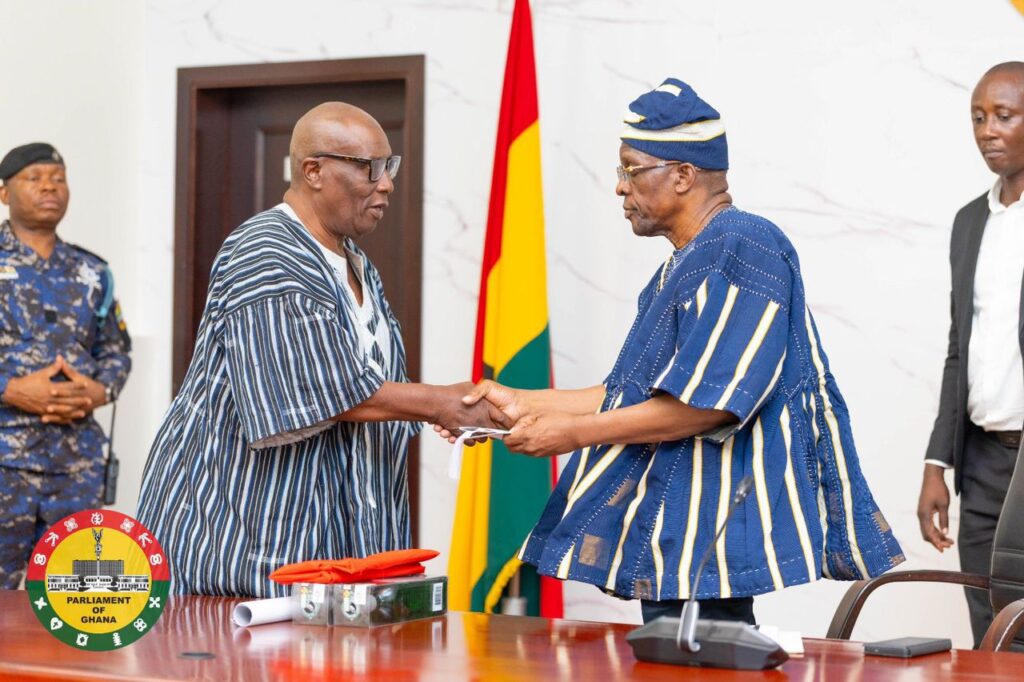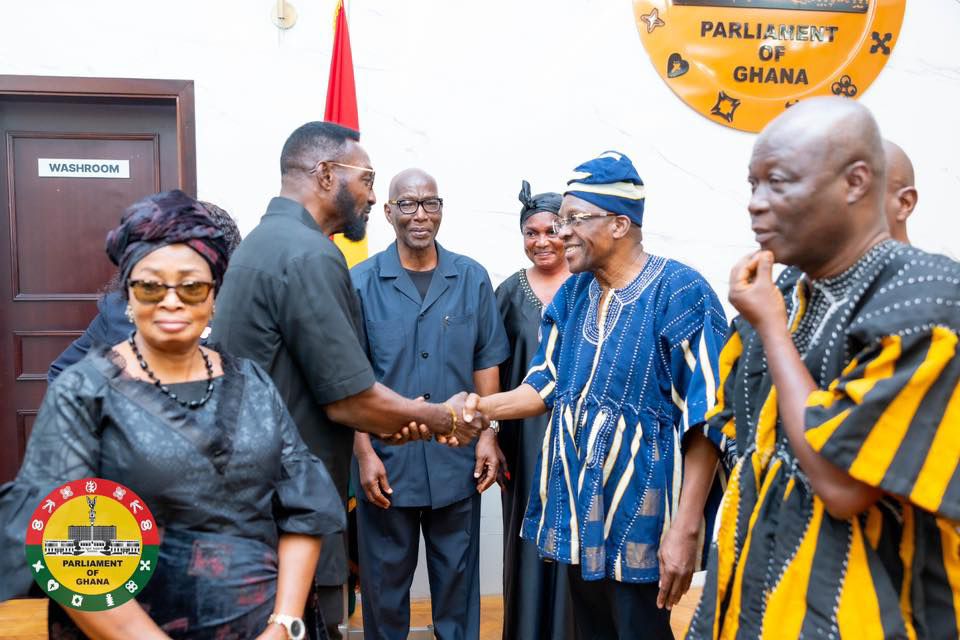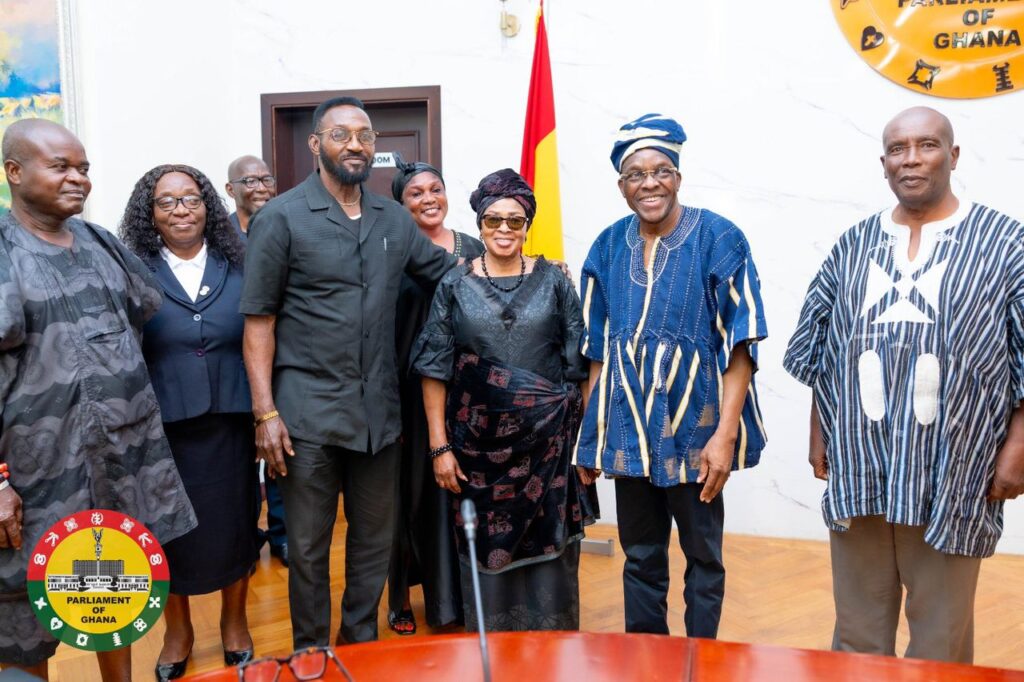Speaker Bagbin Calls on Ga Royal Families to Drive Development Through Chieftaincy
The Speaker of Parliament, Rt. Hon. Alban Sumana Kingsford Bagbin, has urged Ga royal families and traditional leaders to harness the power of chieftaincy and cultural heritage as tools for driving sustainable development in the Greater Accra Region.
Speaking during a courtesy visit at Parliament by the family of the late Madam Agnes Yacoba Conduah, mother of Hon. Alfred Okoe Vanderpuije (MP for Ablekuma South), the Speaker emphasized the need for the Ga people to unite and take the lead in transforming the capital city.
According to the Speaker, the development of Greater Accra is essential to Ghana’s broader national progress. Drawing comparisons with how traditional institutions in other countries have contributed to their national growth, Mr. Bagbin stated that Ghana must similarly embrace its indigenous systems to achieve holistic development.
“If Greater Accra is underdeveloped, Ghana cannot develop effectively,” the Speaker noted. He stressed that just as former colonial rulers use their monarchies as symbols of progress and national unity, Ghana’s royal families especially those from the Ga State must assume a proactive role in shaping the region’s future.

As Ghana’s capital and economic hub, Accra plays a central role in national policy, commerce, and governance. Yet the region continues to face persistent developmental challenges, including urban congestion, limited housing infrastructure, sanitation concerns, and inadequate traditional leadership cohesion.
The Ga State, historically custodians of the land on which the capital stands, has over the years experienced chieftaincy disputes and fragmented leadership structures. These conflicts have, at times, slowed communal development efforts and hindered cultural preservation.
The Speaker’s call, therefore, comes at a time when many believe traditional institutions must work more collaboratively with state structures to tackle urban challenges.
The remarks were made on the sidelines of a condolence visit by the family of Hon. Alfred Okoe Vanderpuije, who came to officially inform the Speaker of the passing of his mother, Madam Agnes Yacoba Conduah. She is scheduled to be laid to rest on Thursday, 16th October 2025.
Leading the delegation, Jacob Herbert Nii Okanta Vanderpuije extended a formal invitation to the Speaker for the funeral. The gathering also included Hon. Edwin Nii Lante Vanderpuije, a former MP for Odododiodio, who expressed gratitude for the Speaker’s warm reception and longstanding commitment to Greater Accra’s progress.

The Speaker’s appeal underscores a growing recognition that cultural institutions remain key partners in governance and development. As Ghana continues to navigate rapid urbanization, community-driven initiatives rooted in traditional leadership can complement formal state mechanisms.
Ghana’s 1992 Constitution acknowledges the importance of chieftaincy and traditional councils, though their role in active development has varied across regions. In the Ashanti Region, for instance, the Asantehene’s leadership has been instrumental in promoting health and education initiatives. Similar models can be replicated in Greater Accra if Ga leaders are aligned.
Several traditional councils in Ghana have taken bold steps to integrate development with heritage:
- In the Ashanti Region, the Otumfuo Osei Tutu II Charity Foundation has funded multiple schools and clinics, showcasing how traditional rulers can impact lives beyond symbolic roles.
- In Ada, chiefs have worked with investors to promote eco-tourism and salt mining, improving livelihoods for thousands of residents.
- Recently in La, a youth empowerment programme launched by the local traditional council helped over 200 young people acquire skills in carpentry, catering, and ICT.
Such initiatives highlight the potential of local leadership in driving progress at the community level.

Rt. Hon. Bagbin’s remarks reflect a broader sentiment that development should be a shared responsibility between political institutions, traditional authorities, and citizens. Greater Accra, as the heart of Ghana’s governance and economic activity, cannot afford to lag behind.
With the region facing increasing pressure from population growth, climate-related risks, and infrastructural strain, traditional leaders can help mobilize support, preserve land for communal use, and mediate disputes that often block progress.
The Speaker’s message is not just a call to action for the Ga State, but a reminder that Ghana’s cultural roots are deeply intertwined with its national identity and growth. By integrating traditional leadership into modern development agendas, the country stands to build a more inclusive, resilient, and culturally grounded future.
Read also: 10 Arrested in Online Food Scam Targeting Ghanaians: Police Warn of Rising Digital Fraud

